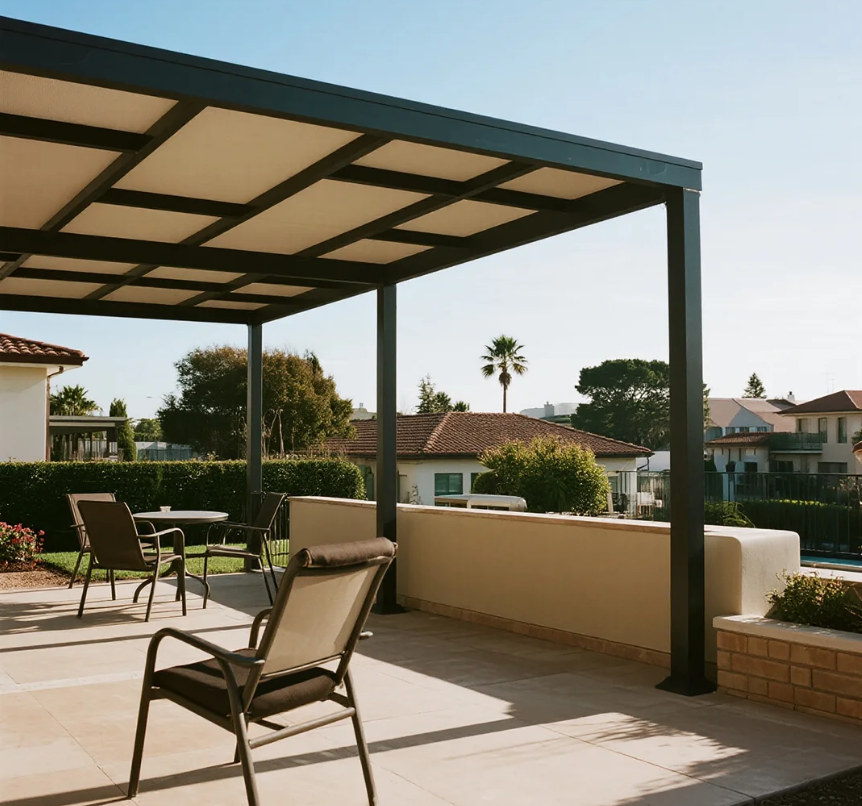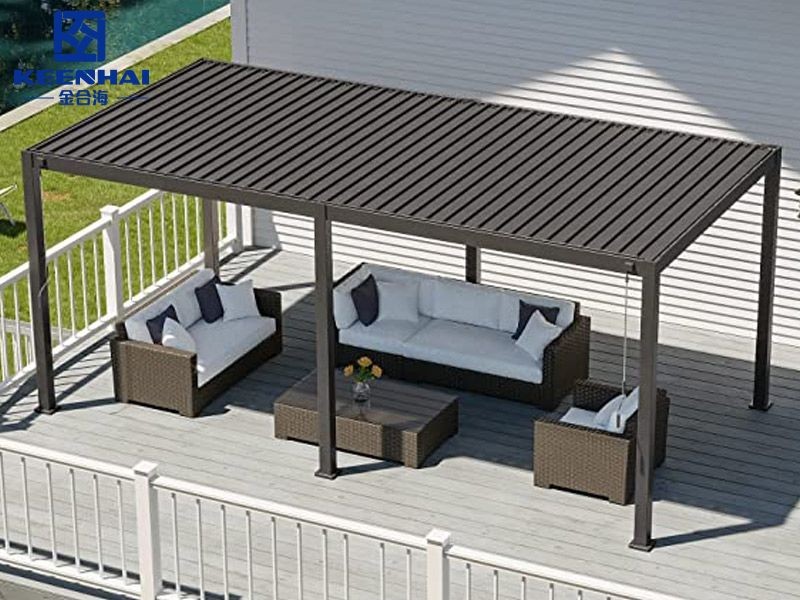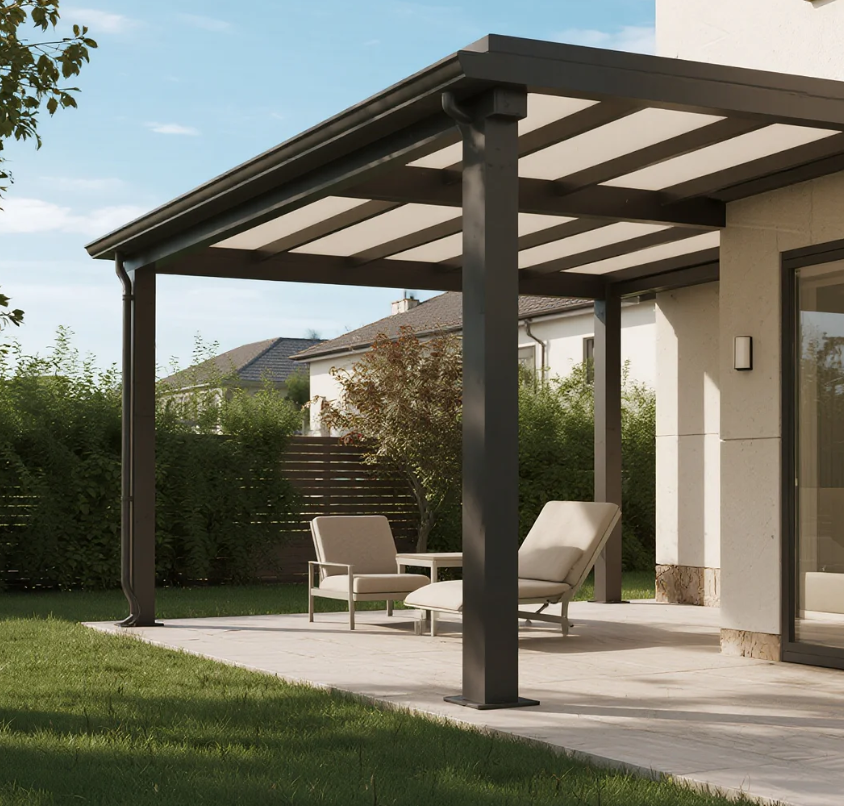
Product Specifications and Materials
What materials are used for the pergola frame?
When choosing a pergola, the frame material determines the overall strength, durability, and maintenance requirements. Most high-quality pergolas use aluminum, steel, or wood, but aluminum dominates modern outdoor solutions due to its unmatched balance between strength and weight. Aluminum frames resist rust and corrosion naturally, which makes them ideal for humid or coastal environments. For example, many contemporary designs such as Aluminum modern pergola incorporate powder-coated aluminum, which provides an extra protective layer, increasing lifespan beyond 15 years under typical outdoor exposure.
Wood, often cedar or redwood, offers a classic aesthetic but demands more upkeep to avoid rot, warping, and insect damage. Steel frames provide superior strength but require high-quality coatings to prevent rust, especially when exposed to rain or salty air.
Aluminum louvered pergolas have become popular due to their innovative roof systems, offering adjustable slats to control sunlight and ventilation. The lightweight nature of aluminum allows for easier installation and reduces structural load on foundations. Check options like Louvres Pergola for advanced aluminum frame systems integrated with louvered roofs.
Are the materials weather-resistant and durable?
Outdoor furniture and structures must withstand years of sun, rain, wind, and sometimes snow. Aluminum ranks among the most weather-resistant materials for pergolas. It naturally forms a thin oxide layer on its surface that protects against rust and corrosion, unlike steel, which depends on coatings. Powder-coating aluminum improves resistance to UV rays and abrasion, keeping colors vibrant and surfaces smooth over long periods.
Steel offers excellent structural support but requires galvanization or powder coatings to survive outdoor conditions. Without protective finishes, steel corrodes quickly, which shortens its service life and compromises safety. Wood varieties like cedar contain natural oils that resist decay but still need yearly sealing or staining. Moisture and sun cause wood to expand and contract, potentially cracking joints and requiring repairs.
To quantify durability, a properly coated aluminum pergola can last 20+ years with minimal maintenance, while steel pergolas often require repainting every 3-5 years to prevent rust. Wood pergolas typically last 10-15 years before major restoration is necessary.
| Material | Weather Resistance | Expected Lifespan | Maintenance Frequency |
|---|---|---|---|
| Aluminum | Excellent (natural oxide) | 20+ years | Clean twice a year |
| Powder-coated Aluminum | Superior (UV, abrasion resistant) | 20+ years | Clean twice a year |
| Galvanized Steel | Good (requires coating) | 15-20 years | Repaint every 3-5 years |
| Wood (Cedar/Redwood) | Moderate (natural oils) | 10-15 years | Seal/stain yearly |
The Aluminum louvered roof gazebo combines durable aluminum frames with adjustable slats, offering weather protection and flexible shade control without compromising structural strength.
What finishes or coatings are applied to prevent corrosion?
Finishes enhance material lifespan and aesthetic appeal. Powder coating ranks as the top finish for aluminum pergolas, creating a dense, protective layer that resists fading, scratching, and corrosion. This process involves applying dry powder electrostatically, then curing it under heat to form a hard finish that bonds tightly to the surface. Quality powder coatings come in multiple color options and can withstand temperatures ranging from -40°F to 200°F without cracking or peeling.
Galvanization protects steel by applying a zinc coating that sacrificially corrodes before the steel beneath. However, this coating wears down over time, especially in harsh climates, requiring additional paint layers for longer life.
Wood pergolas typically receive water-repellent sealers or stains that penetrate the grain and slow moisture absorption. Some manufacturers use water-based polyurethane or oil-based stains to enhance UV protection.
Below are the common coatings and their main benefits:
| Coating Type | Applicable Material | Key Benefits | Typical Lifespan |
|---|---|---|---|
| Powder Coating | Aluminum | UV resistant, corrosion protection, color retention | 15-20 years |
| Galvanization | Steel | Rust prevention, sacrificial protection | 5-10 years |
| Water-Repellent Sealer | Wood | Moisture barrier, reduces cracking | 1 year (requires reapplication) |
| Stains (Oil or Water-based) | Wood | UV protection, aesthetic enhancement | 1-2 years |
Choosing a powder-coated aluminum pergola means investing in long-lasting quality with minimal upkeep, perfect for customers seeking a maintenance-free outdoor solution. If you prefer a dynamic roof system, explore the Louvres Pergola, which uses advanced aluminum frames with powder-coated finishes for enhanced durability.

Customization and Design Options
Can the pergola size be customized to fit my space?
When you're buying a pergola, the first thing you want to know is if it can actually fit your yard or patio. Most manufacturers in the U.S. offer flexible sizing options because everyone's outdoor space looks different. Whether you have a tiny balcony or a sprawling backyard, pergolas can be tailored to your exact dimensions.
You usually start by measuring the width, length, and height you want. Standard pergolas often come in sizes like 10x10 feet, 12x12 feet, or 10x20 feet, but many makers will cut those dimensions up or down to match your space. Custom sizing is especially popular in urban or suburban areas where space is tight.
Some manufacturers offer modular pergolas with adjustable widths or extendable features so you can add sections later if needed. This is helpful if you want to plan for future expansion without buying a whole new structure.
If you want a truly custom fit, the process generally goes like this:
-
Provide the exact measurements of your intended installation area, including ceiling height if applicable.
-
Discuss with the manufacturer about any obstacles like walls, trees, or uneven ground that might affect design.
-
Choose or design a frame that fits within those measurements, making sure it won't interfere with doors, windows, or other structures.
-
Confirm final specs and get a drawing or digital rendering before production.
In places like California or Florida, where outdoor living is huge, manufacturers have refined their custom sizing to fit decks, poolside lounges, or rooftop terraces perfectly.
When you consider adjustable roof systems, such as louvered pergolas, the size matters even more because the louvers need to fully cover the top without gaps. A great example is the Louvres Pergola, which is often custom-sized for precise fit and function.
Are there different styles or roof types available?
Yes, pergolas come in a wide range of styles and roof types to match your taste and functional needs. The classic open-top pergola is just the starting point. Modern designs often include:
-
Louvered roofs: These have adjustable aluminum slats that tilt to control sunlight and ventilation. Perfect for places with changing weather or strong sun, like Texas or Arizona. They let you enjoy shade or full sun with just a flick of a switch or remote.
-
Retractable fabric roofs: Some pergolas feature a motorized or manual retractable canopy, usually made from weather-resistant fabric. These offer more flexibility but need occasional maintenance to avoid wear or mildew.
-
Solid roofs: For maximum protection, solid roofs use materials like polycarbonate, metal panels, or shingles. They’re great for rain protection but block sunlight entirely.
-
Hybrid roofs: Combining louvered and solid elements, these allow sections of the roof to open or close depending on weather or preference.
Style-wise, you can choose between ultra-modern minimalist frames, rustic wood-inspired designs, or something more ornamental with decorative columns and trims.
In the U.S., aluminum louvered pergolas have gained massive popularity because they blend durability with sleek looks. Check out the Aluminum louvered roof gazebo for examples of how this style enhances outdoor spaces.
Can I choose colors or additional features (e.g., retractable roof, lighting)?
Absolutely. Color customization is a big deal because your pergola should match or complement your home and landscape. Most manufacturers use powder-coated finishes that come in dozens of colors, from matte blacks and whites to earthy browns and bold reds.
Many also offer custom color matching if you want to perfectly align with your house trim or outdoor furniture.
On top of colors, you can add features that upgrade both comfort and style:
-
Motorized retractable roofs or louvers that open or close with a remote control or smartphone app. This technology is more common in newer pergolas, giving you instant weather control.
-
Built-in LED lighting, which can include ambient lights, spotlights, or color-changing LEDs for mood settings. Some systems even sync with music or smart home setups.
-
Integrated heating options like infrared heaters or gas lamps to extend the use of your pergola into cooler months.
-
Screens or curtains for privacy and insect protection. Some are manual; others roll up automatically.
-
Speakers and sound systems designed to blend seamlessly into the pergola’s structure.
If you want these extras, be sure to ask the manufacturer if they come pre-installed or if you need a third-party specialist to handle the add-ons.
Choosing a pergola with all these customization options makes your outdoor living space truly personal and functional. Whether you want a simple shaded area or a full-featured backyard retreat, the right manufacturer will offer plenty of choices to make it happen.

Installation Process and Support
Is professional installation included or recommended?
When you buy a pergola in the U.S., the question of installation is a big deal. Some companies include professional installation in the price, but many sell the pergola kit only and expect you to arrange installation separately. If you want a hassle-free experience, hiring professionals is strongly recommended. Installing a pergola isn’t always as simple as just putting pieces together—especially if you’re dealing with larger structures or advanced roof systems like louvered tops.
Professional installers know how to handle important details like leveling the posts, anchoring the structure securely to concrete or wood decks, and making sure the roof mechanism operates smoothly. Plus, they’re familiar with local building codes and permits that might apply. Skipping this step could mean the pergola isn’t stable or safe, especially in areas prone to wind or snow loads like the Midwest or Northeast.
However, if you’re a handy person with solid DIY experience and the pergola is on the smaller side, many companies provide clear instructions and all the hardware needed. Still, be realistic about your skills and tools. You’ll need drills, levels, and sometimes heavy lifting help. For example, aluminum frames can be lightweight but awkward to handle, and louvered roofs have moving parts that must be installed precisely.
Do you provide detailed installation instructions or support?
Most U.S. pergola manufacturers supply detailed installation manuals that include step-by-step guidance with photos or diagrams. These instructions often walk you through:
-
Preparing the site (leveling, clearing debris)
-
Setting and securing posts or footings
-
Assembling beams and crossbars
-
Installing roof panels, louvers, or fabric covers
-
Final tightening and weatherproofing
Some companies go a step further by offering video tutorials online or phone support during your installation. A few high-end brands even provide remote video consultations where a technician guides you through tricky steps in real time.
Keep in mind that the quality and clarity of installation instructions vary widely. Some manuals are very thorough and user-friendly, while others might leave out small but crucial details, causing frustration during assembly. Before buying, ask the manufacturer about the type of support they offer—especially if you plan to install it yourself.
If your pergola includes motorized louvers or electrical features like LED lighting, installation support becomes even more important. These systems usually require some electrical work or technical know-how, so manufacturers might recommend licensed professionals for those parts.
How long does the typical installation take?
Installation time depends on the pergola’s size, style, and your experience level. For a standard 10x10-foot aluminum pergola without a complicated roof, professional installers usually finish within 4 to 6 hours on a prepared site. If the ground needs leveling or concrete footings have to be poured first, that adds a day or two before assembly even starts.
DIY installations take longer. For someone reasonably skilled, expect 1 to 3 days, including unboxing, organizing parts, and actual assembly. It helps to have a second person assisting, especially when lifting beams or aligning components.
If you choose a pergola with adjustable louvered roofs, motorized features, or integrated lighting, plan for additional time:
-
Installing the louver system can add 2 to 4 extra hours
-
Electrical hookups for lighting or motors might require a licensed electrician and can take several hours more
Permits or inspections required in some U.S. municipalities can also stretch out the timeline. In places like California or New York, local codes often demand engineered drawings and permit approvals before installation starts.
Bottom line: Knowing the complexity of your pergola and your own skills upfront helps set realistic expectations on timing. Ask your manufacturer or installer for an estimated timeline based on your model and site conditions. This way, you avoid surprises and plan your outdoor project smoothly.

Warranty and Maintenance
What warranty coverage is offered on materials and workmanship?
When buying a pergola in the U.S., understanding the warranty is crucial because it protects your investment. Most reputable manufacturers offer warranties covering both materials and workmanship, but the specifics vary widely.
Typically, aluminum pergolas come with warranties ranging from 10 to 20 years on the frame against defects like corrosion, structural failure, or manufacturing flaws. This long coverage reflects aluminum’s durability and resistance to rust, which makes it a favorite in areas with harsh weather conditions like coastal Florida or the Pacific Northwest.
Workmanship warranties usually cover issues like faulty assembly, loose fittings, or problems with moving parts (such as those in a Louvres Pergola system). These warranties tend to last from 1 to 5 years, depending on the manufacturer.
Wood pergolas generally have shorter warranties, often limited to 5 years, due to their natural susceptibility to weather damage and decay. Always check if the warranty excludes damage caused by improper maintenance or extreme weather events like hurricanes or heavy snow.
Many manufacturers in the U.S. provide limited lifetime warranties on powder coatings applied to aluminum frames, which guarantees the finish won’t peel, crack, or fade under normal exposure. This is a huge plus for outdoor furniture exposed to intense sun.
Make sure you get the warranty in writing and clarify:
-
What exactly is covered? Frame, roof system, hardware?
-
Are labor and shipping costs included for repairs or replacements?
-
What voids the warranty? (Common reasons include improper installation, DIY modifications, or lack of maintenance.)
Knowing these details upfront saves headaches if something goes wrong.
What maintenance is required to keep the pergola in good condition?
Maintenance depends on the material but generally involves straightforward tasks. For aluminum pergolas, especially those with powder-coated finishes, maintenance mainly means cleaning off dirt, pollen, and debris twice a year with mild soap and water. Avoid harsh chemicals or abrasive tools that can damage the finish.
Check and lubricate moving parts like louvers or retractable roofs annually to keep mechanisms smooth. This is especially important for products like the Aluminum louvered roof gazebo, where motorized or manual adjustment depends on free-moving parts.
For wood pergolas, expect more work. You'll need to reapply sealants or stains every year to prevent water damage and UV deterioration. Inspect for cracks, splinters, or insect damage regularly. Repair any small issues promptly to avoid costly repairs later.
In any pergola, fasteners and anchors should be checked yearly to make sure the structure remains stable and safe. Wind and temperature changes can loosen bolts or screws over time.
If your pergola has integrated lighting, heaters, or other electrical features, those components require separate maintenance schedules, usually involving professional servicing to ensure safety and functionality.
Are replacement parts available if needed?
Good manufacturers stock replacement parts for common wear items like louvers, motor units, brackets, or bolts. In the U.S. market, suppliers understand that pergolas face heavy use and weather stress, so parts availability is a key factor.
If you buy a pergola with a louvered roof system, ask if replacement louvers or motors can be ordered individually. These parts tend to wear out or break first, especially in high-use environments or extreme weather zones.
Replacement hardware like screws, anchors, or fasteners is typically easy to get, often included in a parts catalog or available on the manufacturer’s website. If your pergola model has unique or proprietary components, ensure the manufacturer guarantees parts availability for at least 5 years after purchase.
When ordering replacement parts, having your pergola’s model number, purchase date, and installation details ready speeds up the process.
A good example is the Keenhai product line, where you can find not only full pergola sets but also accessories and spare parts online: check their other pergola products for more options.
